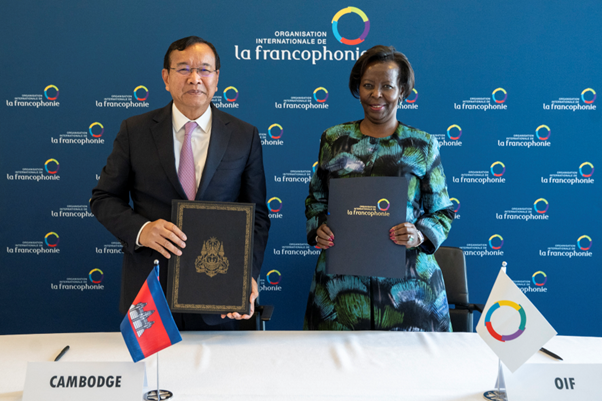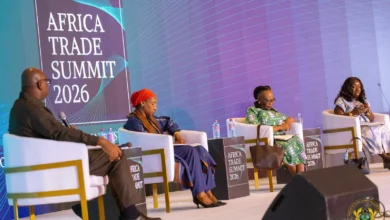Francophonie : Cambodia to host the 20th summit
This is the result of an agreement concluded between this Southeast Asian country and the International Organization of La Francophonie. The 20th Francophonie Summit takes place at a crucial moment for the organization, particularly in Africa…

By Bernard Bangda
According to a press release from the communication department of the International Organization of La Francophonie (OIF), on June 11, 2025, in Siem Reap, Cambodia, the OIF and the Kingdom of Cambodia signed an agreement designating Siem Reap as the host city of the 20th Francophonie Summit, to be held during the last quarter of 2026.
To finalize this agreement, the Secretary-General of La Francophonie, Louise Mushikiwabo, received in audience Sokhonn Prak, the Deputy Prime Minister and Minister of Foreign Affairs and International Cooperation of the Kingdom of Cambodia.
His Majesty the King-Father Norodom Sihanouk, one of the four founders of La Francophonie, will welcome this Summit

As a reminder, it was at the Villers-Cotterêts Summit in France, in October 2024, that the OIF committed to making the Kingdom of Cambodia the host country of this 20th edition. This will be the second Summit organized in Asia, nearly thirty years after the historic Hanoi edition in 1997. However, it will be the first time that Cambodia, whose His Majesty King-Father Norodom Sihanouk was one of the four founders of La Francophonie, will host this major event of the Francophone family.
The OIF’s press release states that “the Summit will illustrate the vitality of Francophonie in Southeast Asia, confirming the renewed commitment of Cambodia and the OIF to dialogue, solidarity, and shared development within the Francophone space.”
The Francophonie Summit, held every two years, is the supreme body of La Francophonie.
321 million people speak French worldwide, nearly 62% of them in Africa: the future of Francophonie is largely being shaped on the continent
The 20th Francophonie Summit takes place at a crucial moment for the organization, especially in Africa. More than 321 million people speak French worldwide, nearly 62% of whom are in Africa—that is over 160 million daily speakers, an increase of 15% since 2018. These figures confirm that the future of Francophonie is largely played out on the continent, even though French proficiency is declining in some countries due to erosion in the quality of education.
A considerable economic potential
The rise of Francophone Africa offers considerable economic potential: OIF member countries represent 16% of the global GDP, 20% of international trade, and house 15% of the world’s energy and mineral resources. Despite this, the French language suffers from competition from English, including within international organizations.
In this context, Secretary-General Louise Mushikiwabo reminds us of the need for a pragmatic approach: “Africa is the continent of youth, a continent carrying the future of Francophonie.” The OIF is thus called to play the role of facilitator in a Francophone space torn between cultural heritage and aspirations for increased economic and political influence.
Making Francophonie a genuine instrument of development
The challenges are many: ensuring quality education (currently, more than 75 million students are enrolled in French-language schooling in sub-Saharan Africa), strengthening linguistic diversity within the organization, and making Francophonie a true tool for development, according to analyst Anani Sossou.
The Siem Reap Summit will therefore need to address these issues: revitalizing Francophone education, renewing diplomatic influence, promoting regional economic integration, and adapting the OIF to Africa’s cultural diversity.






